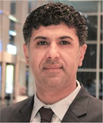Session 27. Oral Presentation for: CarbonNet project: carbon capture and storage case study – subsea system design challenges and opportunities
Bassem Youssef A *A

Bassem Youssef is a subsea pipeline engineer with over 23 years of experience in the design and analysis of both offshore and onshore structures and pipelines. His extensive experience spans a variety of projects, including offshore and onshore pipelines, as well as shore crossing design. He has been involved in all project phases, from concept design to pre front-end engineering design (FEED), FEED, detailed design, and providing engineering support for operations, life extensions, and the repurposing and decommissioning of pipeline systems. Bassem has also contributed to numerous carbon capture and storage studies. Bassem received his PhD in 2011 from the Centre for Offshore Foundation Systems at the University of Western Australia. His doctoral research focused on the on-bottom stability of offshore pipelines. |
Abstract
Presented on 29 May 2025: Session 27
The CarbonNet project represents a pioneering and strategic intiative in the realm of carbon capture and storage (CCS) within the Gippsland region of Victoria, Australia. It is specifically designed to facilitate the state’s ambitious net zero emissions target by receiving carbon dioxide (CO2) emissions from industrial sources and securely store them in geological formations offshore. This paper presents an overview of CarbonNet’s development stages, focusing on its transition into a multi-user CCS hub. Key aspects include the project’s objectives, infrastructure, technical challenges, and innovative solutions. Initially conceptualised in 2009, CarbonNet has evolved through rigorous stages: concept and regional screening, feasibility and site selection, and in 2024, the project development and commercial establishment. The proposed pipeline network consists of an 80 km onshore pipeline and a 17 km offshore subsea pipeline, designed to transport CO2 to the Pelican Reservoir storage site, a saline reservoir under Bass Strait. Critical to the system’s design is adherence to Australian/New Zealand Standards AS/NZS 2885.1 for pipeline construction, ensuring durability and safety. During the front-end engineering design (FEED) phase, challenges were encountered, particularly in flow assurance and material selection. Steady-state and transient analyses were conducted to optimise pipeline sizing, assess operating conditions, and ensure integrity under varying scenarios. The project also addresses potential risks like stress corrosion cracking and hydrate formation, implementing rigorous testing and monitoring to mitigate these issues. The findings provide valuable insights into CO2 impurity levels, pipeline material resilience, and the integration of advanced technologies within CCS infrastructure. Ultimately, CarbonNet contributes to global efforts to reduce carbon emissions.
To access the Oral Presentation click the link on the right. To read the full paper click here
Keywords: carbon capture and storage (CCS), carbon dioxide (CO2) emissions, CCS hub, digital acoustic sensing, subsea reservoir storage.
 Bassem Youssef is a subsea pipeline engineer with over 23 years of experience in the design and analysis of both offshore and onshore structures and pipelines. His extensive experience spans a variety of projects, including offshore and onshore pipelines, as well as shore crossing design. He has been involved in all project phases, from concept design to pre front-end engineering design (FEED), FEED, detailed design, and providing engineering support for operations, life extensions, and the repurposing and decommissioning of pipeline systems. Bassem has also contributed to numerous carbon capture and storage studies. Bassem received his PhD in 2011 from the Centre for Offshore Foundation Systems at the University of Western Australia. His doctoral research focused on the on-bottom stability of offshore pipelines. |


